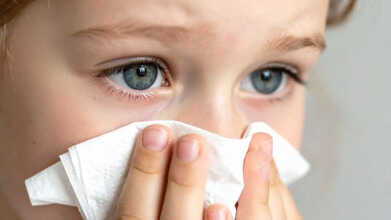- Health Conditions A-Z
- Health & Wellness
- Nutrition
- Fitness
- Health News
- Ayurveda
- Videos
- Medicine A-Z
- Parenting
Weekly Health Horoscope December 1 – 7, 2024: Avoid Dining Out Instead Eat Home-Cooked Meals, Zodiacs

Weekly Health Horoscope December 1 – 7, 2024
Aries Horoscope
Aries people have to pay great care to their emotional as well as their physical health next week. Your physical state may stay the same, but small health problems could develop—especially for senior people with kidney or heart problems. If you are uncomfortable, see a doctor right away. Steer clear of heavy exercise and underground conditions that can compromise your breathing. Rest should be first priority for pregnant Aries women; they should also avoid travel or intense exercise. Emphasize quick, balanced meals high in vitamins and proteins as well as mindfulness techniques like meditation to help with stress.
Taurus Horoscope
Taurus, health could feel a little delicate this week, with minor setbacks possible. In the early half of the week certain Taurus locals may have heart, kidney, or lung-related issues. Children and pregnant people should avoid any potentially dangerous physical activity; elders should use caution when walking up or down the stairs. Give self-care top importance by guaranteeing a healthy food and enough sleep. Steer clear of deep- fried treats and substitute lighter, better choices. Meditation or little physical activity will help you to revitalize your energy.
Gemini Horoscope
This week your health seems steady, and there are no obvious problems ahead. Still, little annoyances like eye strain or joint pain could show up. This is a great week to think about lifestyle changes such yoga starting or alcohol ceasing. Should anxiousness or anxiety strike, do not hesitate to consult a doctor. Participate in outdoor sports to increase your mental clarity and vitality; but, try not to overdo it.
Cancer Horoscope
Generally, this week seems to be good for your health. Having said that, especially during the first half of the week, pregnant women should use caution when riding or traveling on cars. Daily meditation or modest exercise can help you have a calm and balanced attitude given any work-related tension on the cards. Watch your diet to prevent digestive problems or stomach aches. Eating nutrient-dense foods and keeping hydrated will help you be generally healthy.
Leo Horoscope
Leos should see improvement in their general health and healing from any residual diseases this week. Even some people might be let out of hospitals. Elderly family members are probably going to be stable, which will help to bring peace of mind. Still, stay away from demanding surroundings and isolate yourself from negative people. Add fresh fruit and vegetables to your meals to boost your vitality.
Virgo Horoscope
Virgo Health calls for focus this week especially if you have diabetes or high blood pressure. Though they may provide little difficulties, they will probably go away with appropriate treatment. Participate in outdoor or water-based activities carefully. This week is a great chance to improve your eating habits; concentrate on well balanced meals with enough nutrients and steer clear of too intense exercise.
Libra Horoscope
Libras have a rather easy health week and no serious issues seem to be present. But it's important to pay attention to little problems. Take your meds on schedule; if you feel uncomfortable, see a doctor. On the road, bikers and cyclists should exercise especially carefulness. While some males may have stomach or throat problems, women could have period-related difficulties that compromise their output. Children should have dental work this week to prevent problems.
Scorpio Horoscope
For Scorpios, this week brings subtle but obvious changes in health. Those with a history of cardiac issues should make sure their workplace and home are stress-free and avoid lifting heavy objects. Seniors may have joint problems or sleep disorders, hence frequent rest and water are rather important. Spend time with friends and relatives to raise your general mental and physical condition.
Sagittarius Horoscope
This week, Sagittarius locals have to give health top priority; they should avoid outdoor sports and refrain from drinking alcohol or smoking. Pregnant women could have minor medical problems that call for care. Seasonal allergies could irritate the eyes, the throat, or the ears. Children could be affected by viral fevers; so, they should exercise care. Though attempt natural solutions before turning to drugs; sleep problems are probably unavoidable. Recovery will depend critically on rest and relaxation.
Capricorn Horoscope
Capricorns have to be alert about their health this week. Respiratory problems or throat infections could call for medical help. Riding two-wheels or participating in any dangerous activity is advised against for pregnant women. Men could get diabetes-related symptoms or anxiousness. During travel, keep a first-aid kit close by; also, make sure your diet is high in fruits and vegetables to sustain energy levels.
Aquarius Horoscope
For Aquarius, this week looks good; no major health problems seem to be ahead. Maintaining a good attitude can help you far more both physically and psychologically. Staying fresh will depend on light physical exercises like walking or stretching and time in nature. For best health, stay away from dining outside and concentrate on home-cooked cuisine.
Pisces Horoscope
Particularly in the second half of the week, Pisces native should be wary of their health. Older people could experience physical low and problems include sleeplessness or dyspnea. Pregnant women should stay wary while driving and refrain from outdoor sports. Avoiding accidents mostly depends on following traffic laws and using road safety techniques. To keep inner tranquility, concentrate on ground-based exercises as yoga or meditation.
Adenovirus: Is The Mystery Illness That’s Spreading Highly Contagious?

Credits: Canva
A little-known virus is spreading steadily across different parts of the world, prompting growing concern among health experts. Often described as “untreatable” because there is no targeted antiviral medicine available, adenovirus is drawing attention due to how tough it is and how quickly it can pass from person to person.
Eric Sachinwalla, medical director of infection prevention and control at Jefferson Health, has cautioned that while most healthy individuals develop only mild illness, people in high-risk groups may face more serious health problems. This raises an important question: just how contagious is this mystery illness that is spreading?
Adenovirus: How Contagious Is It?
Yes, adenovirus is highly contagious and spreads with ease in several ways. It can pass through respiratory droplets released during coughing or sneezing, close physical contact such as hugging or shaking hands, and contact with contaminated surfaces like toys and towels.
It can also spread through fecal matter, particularly during diaper changes, and in some cases through water. According to the CDC, the virus spreads quickly in crowded settings such as schools and daycare centres and can survive for long periods on surfaces, making good hygiene especially important for young children and people with weakened immune systems.
Who Do Adenoviruses Affect Most?
Adenoviruses can infect people of all age groups, but they are most commonly seen in children under the age of five. In babies and young children, the virus often spreads in daycare environments where close contact is common. Children are also more likely to put shared objects in their mouths and may not wash their hands as regularly.
Among adults, adenoviruses tend to spread in crowded living conditions. People staying in dormitories or military housing may have a higher risk of infection. The virus is also known to circulate in hospitals and nursing homes, as per CDC.
Those with weakened immune systems are more likely to become seriously ill from an adenovirus infection. This includes people who have undergone organ or stem cell transplants, as well as those living with cancer or HIV/AIDS. Individuals with existing heart or lung conditions may also face a higher risk of severe illness.
Adenovirus: What Are The Symptoms Of An Adenovirus Infection?
The symptoms of an adenovirus infection depend on the part of the body affected. Most commonly, the virus targets the respiratory system. When it infects the airways, it can cause symptoms similar to a cold or the flu. These may include:
- Cough.
- Fever.
- Runny nose.
- Sore throat (pharyngitis).
- Pink eye (conjunctivitis).
- Ear infection (otitis media).
- Swollen lymph nodes.
- Chest cold (bronchitis).
- Pneumonia.
Adenoviruses can also infect the digestive system. When this happens, diarrhea may occur, along with gastroenteritis. Gastroenteritis is inflammation of the stomach or intestines and can lead to stomach pain, diarrhea, nausea, and vomiting.
In rarer cases, adenoviruses can affect the bladder or the nervous system. Infection of the bladder may result in urinary tract infections. When the nervous system is involved, it can lead to serious conditions affecting the brain, including encephalitis and meningitis.
Flu Incubation Period: How Long Does It Take For Symptoms To Appear?

Credits: Canva
Influenza, commonly called the flu, is a respiratory infection caused by the influenza virus. It is contagious, which means it passes easily from one person to another. Although influenza viruses can circulate throughout the year, infections are seen more often during the fall and winter months. This time is known as the flu season. As flu cases are rising across many parts of the US and UK, here are a few key points to understand, from the incubation period to how easily the virus spreads.
What Is The Flu (influenza)?
The flu is an infection caused by the influenza virus. It usually leads to symptoms such as body and head aches, sore throat, fever, and breathing-related discomfort, which can sometimes become serious. Flu cases tend to peak during the winter months, when large numbers of people may fall ill at the same time, a situation described as an epidemic, according to the Cleveland Clinic.
Flu: What Is The Incubation Period Of The Flu?
The average incubation period of the flu is around 2 days, though it can vary from 1 to 4 days. In simple terms, this means most people begin to notice flu symptoms a few days after the virus enters the body.
When Does The Flu Become Contagious?
After catching the flu virus, a person can start passing it on to others about 1 dayTrusted Source before symptoms appear. Keep in mind that the usual incubation period is about 2 days. So, if someone is exposed to the virus on a Saturday morning, they may already be able to spread it by Sunday evening. By Monday afternoon, flu symptoms are likely to show up. These symptoms can be mild or severe.
Some people may not develop symptoms at all, but they can still spread the virus. The flu is usually most contagious during the first 3 days of illness. After symptoms begin, a person may continue to infect others for another 5 to 7 days. Children, older adults, and people with weaker immune systems may remain contagious for a longer time.
Flu Symptoms 2025: Early Symptoms You Need To Take Care Of
Unlike the common cold, which tends to develop slowly, flu symptoms often appear suddenly.
Common symptoms include:
- feeling extremely tired, exhausted, or weak
- headache
- blocked or runny nose
- sore throat
- dry cough
- muscle and body aches
- fever or chills, although not everyone gets these
- vomiting or diarrhoea, which is seen more often in children
Most people start to feel better within a few days to two weeks. However, some individuals may need antiviral medication, particularly those at higher risk of serious complications.
How Does The Flu Spread?
The flu mainly spreads through tiny respiratory droplets released when an infected person coughs or sneezes. In crowded places, these particles can be inhaled by others, leading to infection. The virus can also spread by touching objects or surfaces that carry the virus, such as door handles or shared personal items. Outside the body, the virus can survive on surfaces for up to one day.
If someone touches a contaminated surface and then touches their eyes, nose, or mouth, the flu virus can enter the body and cause infection.
Taking Warfarin? Doctor Warns This Common Food Could Be Reducing Your Medication’s Effect

Credits: Canva
People who are prescribed blood thinners, also known as anticoagulants, could unknowingly weaken the effect of their medication by eating a widely consumed and otherwise healthy vegetable, a doctor has warned.
What Are Anticoagulants?
Anticoagulants are routinely given to reduce the risk of blood clots and are often prescribed to those who face a higher chance of such complications. This group also includes people at increased risk of heart attacks or strokes. These medicines, which include rivaroxaban, apixaban and warfarin, work by interrupting the clotting process and play a key role in preventing serious conditions such as strokes, heart attacks, pulmonary embolism and deep vein thrombosis.
Warfarin: Why This Common Vegetable Can Be A Problem
While anticoagulants are effective and often lifesaving, patients are being advised that a familiar garden vegetable could interfere with how well these drugs work. The warning comes from Dr Chris Steele, who appeared on ITV’s This Morning to explain how certain foods can interact negatively with different medications.
As part of his advice, he said, as per Express, “Leafy greens are high in vitamin K, which helps blood to clot. Warfarin works by blocking vitamin K production, so if you suddenly increase how many greens you eat, it can affect how the medicine works.”
He added: “Other foods that contain a lot of vitamin K include green vegetables, egg yolks, chickpeas and lentils. These foods don’t need to be removed from the diet, but it is important to keep your intake steady and consistent. You should also avoid drinking large amounts of cranberry juice or using cranberry products while on anticoagulants, as they can alter the effect of warfarin. Garlic and ginger should be limited too, as they can raise the risk of bleeding.”
Warfarin: Other Food And Drug Interactions To Watch For
Dr Chris also highlighted that many other medicines can react in unexpected ways when taken alongside certain foods and drinks. For example, he noted that some antibiotics, including ciprofloxacin, can react poorly with milk.
He explained: “Calcium can reduce how well some antibiotics work, so these medicines should not be taken at the same time as foods high in calcium, such as milk, yoghurt or cheese. Calcium supplements should also be avoided for a few hours before and after taking these antibiotics.
“You should not drink milk when taking certain antibiotics, including tetracycline and ciprofloxacin, which are quinolone antibiotics, or some osteoporosis drugs like alendronate, also known as Fosamax.”
He further advised avoiding the following combinations with specific medicines:
- Grapefruit if you are taking statins for high blood pressure
- Black liquorice if you are on certain heart medicines such as digoxin
- Bananas if you take some ACE inhibitors for high blood pressure
- Coffee if you use bronchodilators for asthma
- Smoked salmon and salami if you are prescribed antidepressants
- Limes if you are taking cough medicine
Dr Chris stressed: “Always speak to your doctor about any precautions you should follow when starting a new medication. You may need to avoid certain foods, make changes to your lifestyle, or take other steps to prevent unwanted side effects.”
© 2024 Bennett, Coleman & Company Limited

